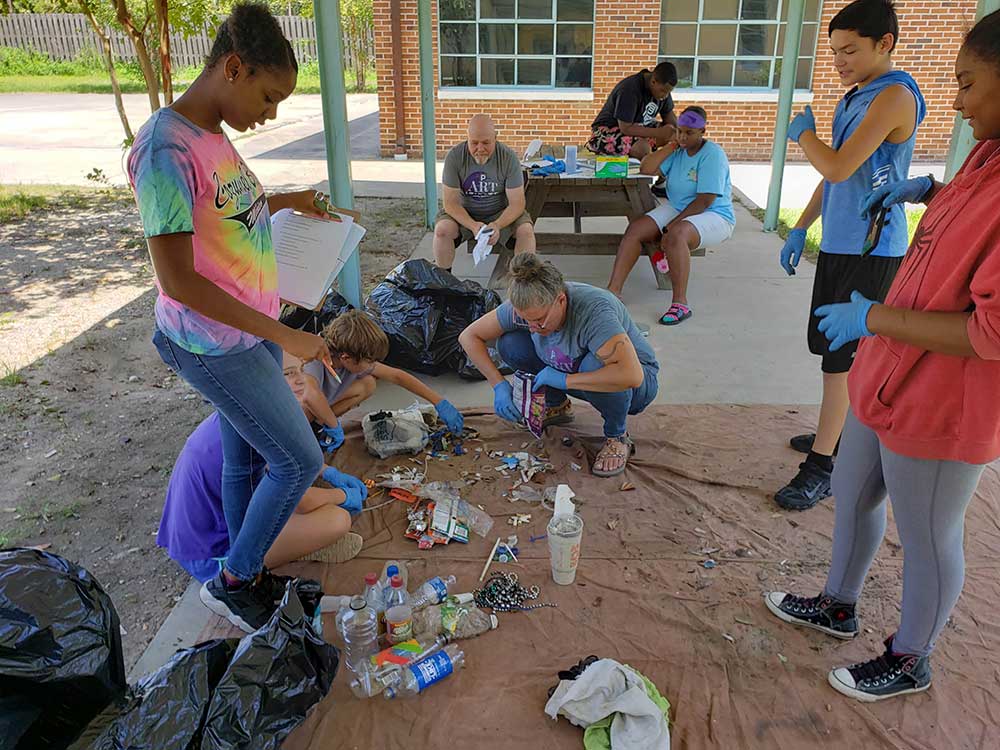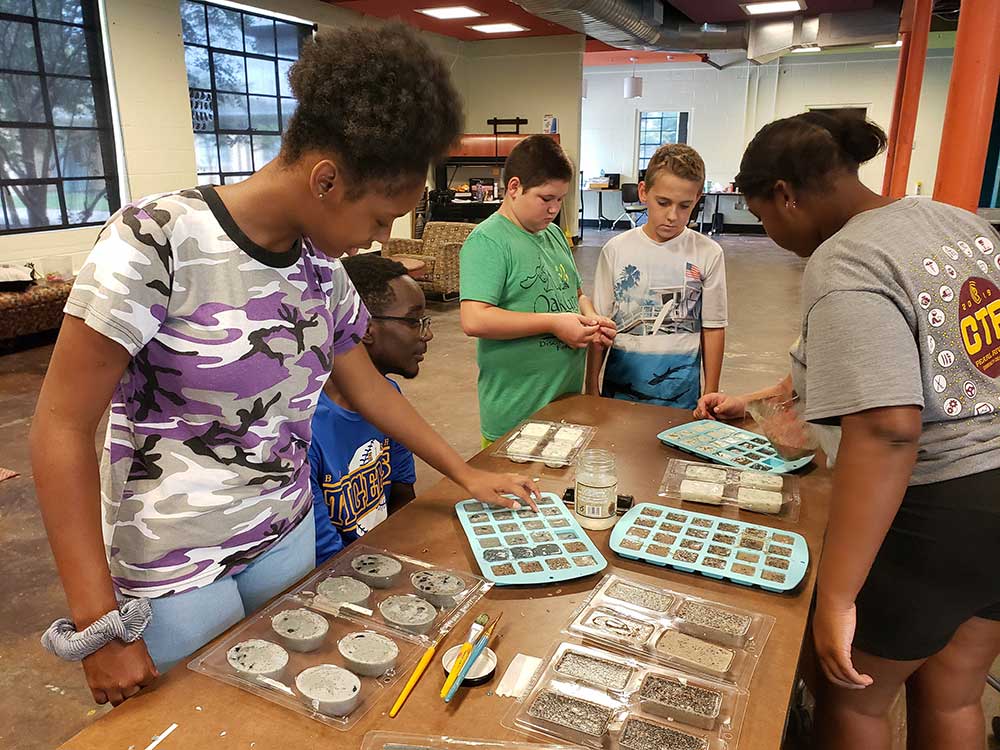By Kelsey Johnson | Assistant Director/Planner, Gulf Coast Community Design Studio
As students are heading back to school on the Coast, three graduates of Bay-Waveland Middle School are wrapping up a summer internship and peer leadership program with Mississippi State University’s Gulf Coast Community Design Studio.
The internship was in partnership with the Hancock County Unit of the Boys and Girls Clubs of the Gulf Coast and the Bay St. Louis Creative Art Center.
Kiana Han, Tasia Williams and Trinity Wilson all completed the program after being nominated by their 8th grade science teacher, GiGi Wheeler. The internship was part of a one-year, grant-funded program through The National Academies of Sciences, Engineering and Medicine focused on Magnolia Bayou Watershed.
Last spring, Wheeler's 8th graders participated in a five-day program led by staff from the Gulf Coast Community Design Studio where students learned about watershed dynamics and the impacts of stormwater runoff on water quality and quantity, particularly around Magnolia Bayou Watershed. Magnolia Bayou is an important local waterway close to both Bay-Waveland Middle School and the Hancock County Unit of the Boys and Girls Clubs.
As part of the program, students were able to go out to the bayou and test water quality alongside the National Oceanic and Atmospheric Administration (NOAA) and other science professionals and explore different low-impact development design strategies that could improve local stormwater management practices.
Han, Williams and Wilson were all nominated for the summer internship opportunity because of their performance in-class and enthusiasm for the subject matter.
"This was such an amazing opportunity for my students. I am so proud of all the hard work that they did and are doing," said Wheeler.
Over the summer, Han, Williams and Wilson worked together and independently under the guidance of staff from the Gulf Coast Community Design Studio and Steve Barney, a local artist and founder of the STEAMpunk pottery project and Bay St. Louis Creative Arts Center.
The internship program was housed at the Hancock County Unit of the Boys and Girls Clubs, and the three young women were challenged with planning and implementing a STEAM (Science, Technology, Engineering, Art and Math) – based program to educate their peers at the club on some of what they had learned about Magnolia Bayou Watershed.
Han, Williams and Wilson focused on three different topics related to improving water quality in Magnolia Bayou Watershed:

- Williams chose to educate students at the club on the impacts of litter, particularly single-use plastic, on local waterways. She organized a clean-up day that included several sites around Bay St. Louis. Students not only picked up litter at the sites, but also weighed and inventoried what they found. The data collection helped the students start to identify litter hot-spots around the watershed and understand more about some of the common sources of litter. Williams also wrote up a proposal for the club to continue with regular litter clean-ups.

- Wilson, inspired by the negative impacts of the recent algae bloom, taught students about how overuse of fertilizers and pesticides affect water quality and how alternative practices, like composting, can help. She led the students in building a compost bin for the club and created a plan so the club can continue to compost and re-start gardening in their courtyard.

- Han educated the students on how the products we use can negatively impact our environment, both because of the chemicals they are made of and the packaging they come in. She chose to guide the students through the process of making organic soap and used the packaging as a creative way to display environmental messages. She also wrote up a plan for the Boys and Girls Club to use the project in the future as a potential fundraiser.
The project was a great success and a learning experience for all involved.
"I have enjoyed watching the passion for this project blossom, not just for these amazing girls but also for their Boys and Girls Clubs of the Gulf Coast friends" said Shannon Anicas, unit director of the Hancock County Unit of the Boys and Girls Clubs of the Gulf Coast. “These partnerships and programs are so beneficial to our students and the larger community.”
The Gulf Coast Community Design Studio (GCCDS) was established on the Mississippi Gulf Coast in 2005 to work in communities impacted by Hurricane Katrina and has evolved from disaster recovery to addressing long-term issues of community resilience. Located in Biloxi, the GCCDS is a professional outreach arm of Mississippi State University's College of Architecture, Art and Design and operates with a full-time staff of around six architects, landscape architects and planners, always working in close collaboration with multiple non-profit, municipal and professional partners. The work of the GCCDS includes: 1) community-based housing design, 2) storm water and tidal ecology, 3) flood resilient buildings and landscape, and 4) public-driven decision making
To learn more about Mississippi State University’s Gulf Coast Community Design Studio, visit: http://gccds.org
To learn more about The National Academies of Sciences, Engineering and Medicine, visit: http://www.nationalacademies.org
To learn more about the Boys and Girls Clubs of the Gulf Coast, visit: https://www.bgcgulfcoast.org